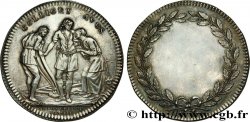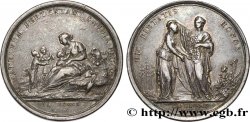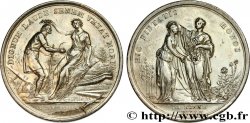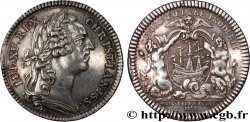fjt_072878 - NORMANDIE (NOBLESSE ET VILLES DE...) Jeton Ar 28, prieur et juges-consuls de Dieppe 1762
无库存.
所有在网站上销售的产品 (2010)
价格 : 42.00 €
所有在网站上销售的产品 (2010)
价格 : 42.00 €
种类 Jeton Ar 28, prieur et juges-consuls de Dieppe
日期: 1762
材质 silver
直径 28 mm
模子方针 6 h.
侧面 cannelée
关于品相的说明
Exemplaire nettoyé mais avec une faible usure de circulation
出版目录中的项代码 :
正面
正面的文字 LUD. XV. REX - CHRISTIANISS..
正面的说明书 Buste lauré et drapé à droite de Louis XV [variété du n° 338] ; au-dessous signature B. DUV. .
正面的翻译 (Louis XV, roi très chrétien).
背面
背面的文字 CIVICO. FŒDERE PRODERIT ; À L'EXERGUE EN DEUX LIGNES : ÆDIL. DEPPÆ COMIT./ 1762.
背面的说明书 Écu aux armes de Dieppe sur un cartouche surmonté d’une tête d’ange et soutenu par deux Néréides ; signature D. V..
背面的翻译 (Elle sera utile à l'alliance civile - Assemblée des notables de Dieppe).
评论
Probablement une association avec un droit de Benjamin Duvivier et un revers de Jean Duvivier, son père. Les juridictions consulaires remontent à Henri II. Dans ces lieux de réunions, les marchands élisent entre eux un prieur et deux juges-consuls qui règlent en première instance les problèmes entre négociants. Les juges-consuls ou juges des tribunaux de commerce sont établis par un édit de 1563. Ils étaient souvent d’anciens consuls (officiers municipaux) d’où leur nom. Au XVIIIe siècle, les juges-consuls jugeaient souverainement jusqu’à 500 livres (au-delà, l’affaire relevait des Parlements).
Probably an association with a right of Benjamin Duvivier and a reverse of Jean Duvivier, his father. Consular jurisdictions date back to Henry II. In these meeting places, merchants elected among themselves a prior and two consul judges who settled in the first instance the problems between traders. The consul judges or judges of the commercial courts were established by an edict of 1563. They were often former consuls (municipal officers), hence their name. In the 18th century, the consul judges judged sovereignly up to 500 pounds (beyond this, the matter fell under the jurisdiction of the Parliaments).
Probably an association with a right of Benjamin Duvivier and a reverse of Jean Duvivier, his father. Consular jurisdictions date back to Henry II. In these meeting places, merchants elected among themselves a prior and two consul judges who settled in the first instance the problems between traders. The consul judges or judges of the commercial courts were established by an edict of 1563. They were often former consuls (municipal officers), hence their name. In the 18th century, the consul judges judged sovereignly up to 500 pounds (beyond this, the matter fell under the jurisdiction of the Parliaments).








 对产品描述纠错
对产品描述纠错 打印
打印 分享我的选择
分享我的选择 提问
提问 Consign / sell
Consign / sell
 产品介绍
产品介绍











